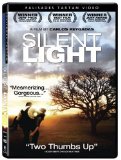| Reviews & Columns |
|
Reviews DVD TV on DVD Blu-ray 4K UHD International DVDs In Theaters Reviews by Studio Video Games Features Collector Series DVDs Easter Egg Database Interviews DVD Talk Radio Feature Articles Columns Anime Talk DVD Savant Horror DVDs The M.O.D. Squad Art House HD Talk Silent DVD
|
DVD Talk Forum |
|
|
| Resources |
|
DVD Price Search Customer Service #'s RCE Info Links |
|
Columns
|
|
|
Silent Light
Vivendi Entertainment // Unrated // September 8, 2009
List Price: $22.99 [Buy now and save at Amazon]
The Film:
Terrance Malick may have mastered the art of the scenic, sparsely narrated picture with the likes of Days of Heaven and The New World, but Carlos Reygadas really pushes the envelope in Silent Light for its exasperatingly expansive shots. It's a story of adultery and a family being unspooled by a father's exploration of his passion for another woman, a five-second plot captured through broad-stroked emotionality and photography that lingers -- and lingers, and lingers. A fluid, touching 100-minute film exists within the two-hour Silent Light, but the lack of control on the cutting room floor leaves its evocative motives trying on the patience during its overwrought, albeit striking, visual focus on connecting nature to love's boundless truth.
Director Reygadas focuses on big-picture emotional condition in capturing the story revolving around Johan (Cornelio Wall), a successful farm worker with a large Mennonite (read: highly conservative Christian) family living a life resembling the highly-religious Amish lifestyle. All the characters are played by non-actors of the Mennonite culture, which breathes a instinctive air into Silent Light that likely couldn't be achieved with seasoned veterans. Their interactions, deliberate and low-key as they shift locations from their dining room to a swimming hole across Chihuahua, Mexico, are paced leisurely to emphasize each sequence's home-grown, familial warmth -- and the subtle discord radiating from Johan and his wife Esther (Miriam Toews), who knows about his affair.
Plot isn't the point of Silent Light, as very little actually happens within its flow. As we're taken through the seasons in grandiose visual fashion, it becomes a collage on the conversations Johan has about his extramarital relationship. Reygadas doesn't ask us to take sides, not in the slightest; instead, much of Silent Light is built around Johan's internal guilt and crisis of faith, which introduces a moral experience that largely predicates on the viewer's outlook on temptation. It's clear that Johan is content when he's with his mistress Marianne, beautifully played by Maria Pankratz, which piques our own perception of his situation. Is he breaking from the latches of his religion, giving into temptation, or answering a call? Though Reygadas likely wants us to interpret it as an internalized war with God, it's more intriguing to process his conflict as a crisis of his own morality instead of his spurned anger with belief.
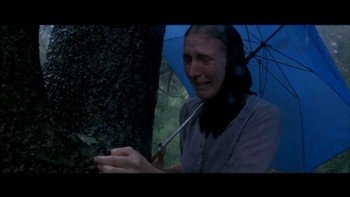 That, of course, is one of the strengths of Silent Light as a semi-religious drama, being that it can carry multiple layers to be digested on several levels. However, it's hard not to see Johan's conversation with his father about the connection between his beliefs and the affair as a pass-off to the will of a higher power, something of a mild scapegoat for his gut feelings. Even at his most selfish, however, it's hard not to empathize with Johan's desires. Yet, still, we're purposefully left without a side to take, as a man tries to remain open and composed to his wife and family while giving in to the "draw" of venturing away from them. Marianne isn't a temptress, Esther isn't a burden, and Johan isn't the sinning type -- which leaves little beyond our absorption of his life-clutching decisions.
That, of course, is one of the strengths of Silent Light as a semi-religious drama, being that it can carry multiple layers to be digested on several levels. However, it's hard not to see Johan's conversation with his father about the connection between his beliefs and the affair as a pass-off to the will of a higher power, something of a mild scapegoat for his gut feelings. Even at his most selfish, however, it's hard not to empathize with Johan's desires. Yet, still, we're purposefully left without a side to take, as a man tries to remain open and composed to his wife and family while giving in to the "draw" of venturing away from them. Marianne isn't a temptress, Esther isn't a burden, and Johan isn't the sinning type -- which leaves little beyond our absorption of his life-clutching decisions.
Still, no matter the interpretation of its content, Silent Light is an immensely well-played morality tale with an eye for emotional context inside every articulate, if excessive, expansively-shot sequence. Reygadas processes the content of each outstretching sequence, especially the taboo yet innate sensations coursing through Johan and Marianne during their tender moments. His enthusiasm for relishing in lengthy nature sequences might grow irksome when they cease to move for several minutes at a time -- including the stunningly yet overlong shot of twilight at the start, along with the equally vexing sunlight to starry sky transition at its close -- but his focus on character emotionality within deafeningly quiet conversations between Johan and his two women are gripping on an expressively intuitive level. It becomes especially redolent in Reygadas' interpretive conclusion, which is startlingly potent within its simplicity.
The DVD:
Video and Audio:
Palisades/Tartan have elected to present Silent Light in an interlaced 2.35:1 anamorphic image, which proves to be rather solid outside of that blemish. Detail remains rather strong in several sequences, from the texture in a brick wall to the beads of sweat rolling down both Johan and Marianne in a sequence. Especially powerful are the nature sequences, from snowy shots and hazy, cloudy days to the splendid sun-drenched sequences at dusk. Though ghosting is prevalent throughout and the image remains slightly soft throughout, Silent Light looks rather good.
Audio is available in Plautdietsch (Low German) Dolby Digital 5.1 and 2.0 tracks, as well as a DTS inclusion. Both of the surround tracks, however, are rather artificial in their surround capacity, which left me surrendering to the desire to select the 2.0 track halfway through the film. Surround elements are overly echoic to an almost perpetual degree, though they only really come into direct play when voices ring out from the rear. It's not a terribly distinct soundtrack, which is a shame since some of nuance from the sound design itself seems drowned in the quality. Still, verbal clarity rings out without distortion and some delicate sound effects, like the splashing of water and very light amorous noises, all remain clear. English and Spanish subtitles are available that appear in the black bar directly below the image itself.
Special Features:
Making of Silent Light (35:53, 4x3):
This lengthy piece focuses on all aspects of shooting the film, from taking a look behind-the-scenes with several sequences to getting a glimpse of the real lives of the non-actors. It's mostly a collage of footage taken from the set, which also includes a few instances of direct interview time. It reveals Reygadas as an artist, showing much of his method as he pulls performances from his performers. Subtitles are burned into the picture throughout.
Also available are some Deleted Scenes (7:19), which are anamorphic but, strangely, windowboxed to appear letterboxed on 16x9 telelvisions, as well as an Interview (7:26) with lead actor Cornelio Wall (which does have optional English subtitles).
Final Thoughts:
Silent Light takes its time telling Johan's story of emotion-driven adultery, a realistic tale that focuses more on the unyielding draw between two people than the need for sexual gratification. It incorporates faith's looming head into the picture as both a beck and call and as a deterrent, though the internal torment suffered by the triangle of characters works more on a personal level than on a spiritual. It can be quite powerful within the over-bloated photography, shot in a fashion that sticks on focus subjects for a bit longer than it probably should -- but still holds resonance even amid its overreaching aims. Though compelling, it's likely a piece of work best Rented first due to its slow pacing and difficult nature.
Thomas Spurlin, Staff Reviewer -- DVDTalk Reviews | Personal Blog/Site
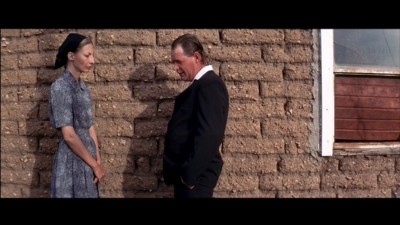 |
Director Reygadas focuses on big-picture emotional condition in capturing the story revolving around Johan (Cornelio Wall), a successful farm worker with a large Mennonite (read: highly conservative Christian) family living a life resembling the highly-religious Amish lifestyle. All the characters are played by non-actors of the Mennonite culture, which breathes a instinctive air into Silent Light that likely couldn't be achieved with seasoned veterans. Their interactions, deliberate and low-key as they shift locations from their dining room to a swimming hole across Chihuahua, Mexico, are paced leisurely to emphasize each sequence's home-grown, familial warmth -- and the subtle discord radiating from Johan and his wife Esther (Miriam Toews), who knows about his affair.
Plot isn't the point of Silent Light, as very little actually happens within its flow. As we're taken through the seasons in grandiose visual fashion, it becomes a collage on the conversations Johan has about his extramarital relationship. Reygadas doesn't ask us to take sides, not in the slightest; instead, much of Silent Light is built around Johan's internal guilt and crisis of faith, which introduces a moral experience that largely predicates on the viewer's outlook on temptation. It's clear that Johan is content when he's with his mistress Marianne, beautifully played by Maria Pankratz, which piques our own perception of his situation. Is he breaking from the latches of his religion, giving into temptation, or answering a call? Though Reygadas likely wants us to interpret it as an internalized war with God, it's more intriguing to process his conflict as a crisis of his own morality instead of his spurned anger with belief.
 That, of course, is one of the strengths of Silent Light as a semi-religious drama, being that it can carry multiple layers to be digested on several levels. However, it's hard not to see Johan's conversation with his father about the connection between his beliefs and the affair as a pass-off to the will of a higher power, something of a mild scapegoat for his gut feelings. Even at his most selfish, however, it's hard not to empathize with Johan's desires. Yet, still, we're purposefully left without a side to take, as a man tries to remain open and composed to his wife and family while giving in to the "draw" of venturing away from them. Marianne isn't a temptress, Esther isn't a burden, and Johan isn't the sinning type -- which leaves little beyond our absorption of his life-clutching decisions.
That, of course, is one of the strengths of Silent Light as a semi-religious drama, being that it can carry multiple layers to be digested on several levels. However, it's hard not to see Johan's conversation with his father about the connection between his beliefs and the affair as a pass-off to the will of a higher power, something of a mild scapegoat for his gut feelings. Even at his most selfish, however, it's hard not to empathize with Johan's desires. Yet, still, we're purposefully left without a side to take, as a man tries to remain open and composed to his wife and family while giving in to the "draw" of venturing away from them. Marianne isn't a temptress, Esther isn't a burden, and Johan isn't the sinning type -- which leaves little beyond our absorption of his life-clutching decisions. Still, no matter the interpretation of its content, Silent Light is an immensely well-played morality tale with an eye for emotional context inside every articulate, if excessive, expansively-shot sequence. Reygadas processes the content of each outstretching sequence, especially the taboo yet innate sensations coursing through Johan and Marianne during their tender moments. His enthusiasm for relishing in lengthy nature sequences might grow irksome when they cease to move for several minutes at a time -- including the stunningly yet overlong shot of twilight at the start, along with the equally vexing sunlight to starry sky transition at its close -- but his focus on character emotionality within deafeningly quiet conversations between Johan and his two women are gripping on an expressively intuitive level. It becomes especially redolent in Reygadas' interpretive conclusion, which is startlingly potent within its simplicity.
The DVD:
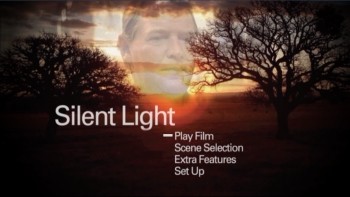 | 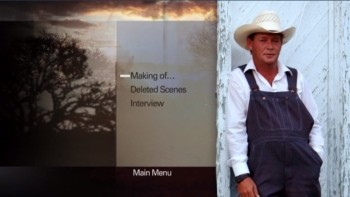 |
Video and Audio:
Palisades/Tartan have elected to present Silent Light in an interlaced 2.35:1 anamorphic image, which proves to be rather solid outside of that blemish. Detail remains rather strong in several sequences, from the texture in a brick wall to the beads of sweat rolling down both Johan and Marianne in a sequence. Especially powerful are the nature sequences, from snowy shots and hazy, cloudy days to the splendid sun-drenched sequences at dusk. Though ghosting is prevalent throughout and the image remains slightly soft throughout, Silent Light looks rather good.
Audio is available in Plautdietsch (Low German) Dolby Digital 5.1 and 2.0 tracks, as well as a DTS inclusion. Both of the surround tracks, however, are rather artificial in their surround capacity, which left me surrendering to the desire to select the 2.0 track halfway through the film. Surround elements are overly echoic to an almost perpetual degree, though they only really come into direct play when voices ring out from the rear. It's not a terribly distinct soundtrack, which is a shame since some of nuance from the sound design itself seems drowned in the quality. Still, verbal clarity rings out without distortion and some delicate sound effects, like the splashing of water and very light amorous noises, all remain clear. English and Spanish subtitles are available that appear in the black bar directly below the image itself.
Special Features:
Making of Silent Light (35:53, 4x3):
This lengthy piece focuses on all aspects of shooting the film, from taking a look behind-the-scenes with several sequences to getting a glimpse of the real lives of the non-actors. It's mostly a collage of footage taken from the set, which also includes a few instances of direct interview time. It reveals Reygadas as an artist, showing much of his method as he pulls performances from his performers. Subtitles are burned into the picture throughout.
Also available are some Deleted Scenes (7:19), which are anamorphic but, strangely, windowboxed to appear letterboxed on 16x9 telelvisions, as well as an Interview (7:26) with lead actor Cornelio Wall (which does have optional English subtitles).
Final Thoughts:
Silent Light takes its time telling Johan's story of emotion-driven adultery, a realistic tale that focuses more on the unyielding draw between two people than the need for sexual gratification. It incorporates faith's looming head into the picture as both a beck and call and as a deterrent, though the internal torment suffered by the triangle of characters works more on a personal level than on a spiritual. It can be quite powerful within the over-bloated photography, shot in a fashion that sticks on focus subjects for a bit longer than it probably should -- but still holds resonance even amid its overreaching aims. Though compelling, it's likely a piece of work best Rented first due to its slow pacing and difficult nature.
|
| Popular Reviews |
| Sponsored Links |
|
|
| Sponsored Links |
|
|
| Release List | Reviews | Shop | Newsletter | Forum | DVD Giveaways | Blu-Ray | Advertise |
|
Copyright 2024 DVDTalk.com All Rights Reserved. Legal Info, Privacy Policy, Terms of Use,
Manage Preferences,
Your Privacy Choices | |||||||









